
A man’s career path can significantly affect his risk of substance abuse. The entertainment industry is well-known for its high rate of drug addiction, but it’s not the only one. The primary factor these careers have in common is generally some type of stress, whether it’s a physical or psychological cause. Each high-risk career has its own particular source of stress and other factors that make substance abuse especially likely.
Overview
Common sources of stress such as fast pace and long hours apply to many careers, which are leading factors for a high rate of addiction in men. However, some professions are particularly demanding of its practitioners, where they must routinely work more than 40 hours per week or they’re responsible for others’ lives. Additional factors that increase the risk of drug addiction include physical labor, which can result in pain and the need for pain-killing medication.
Some professions are particularly stressful such as those where income is directly related to performance. Others may have significant trauma or isolation. Men with these jobs tend to have high rates of depression, largely as a result of failing to meet high levels of expectation. Effective coping skills are essential for men’s career paths and addiction if they handle these negative emotions without turning to drugs.
Stress
Job-related stress is a common reason for men to abuse drugs, although it certainly isn’t the only one. A 2008 study in the Annals of the New York Academy of Sciences shows that stress can disrupt chemical pathways in the brain such as the dopamine, glutamate and Gamma-Aminobutyric acid (GABA) systems. These pathways govern pleasure, relaxation, and stimulation, so their disruption can cause the negative emotions of the stress response. These emotions include the following:
- Agitation
- Anger
- Anxiety
- Depression
- Helplessness
Men often abuse drugs that interact with chemical pathways in an attempt to relieve the stress response. It should, therefore, come as no surprise to learn that men who suffer from chronic stress are at risk for self-medicating with drugs to manage this stress.
Resorting to drug abuse in response to stress is obviously a short-term solution for men’s career and addiction problems. It takes a physical and psychological toll that can cause illness and injury in addition to the risk of overdose that can be fatal. Men with stressful careers should, therefore, look for other techniques that will help them deal with chronic, job-related stress. Those who are already abusing drugs should begin their journey towards recovery through professional, research-based treatment.
Professions
The Substance Abuse and Mental Health Services Administration (SAMHSA) has summarized data on men’s careers that was gathered between 2008 and 2012. It shows that careers in the following business sectors have the highest rates of drug abuse and addiction:
- Hospitality and food service
- Construction and mining
- Arts and entertainment
- Business management
- Healthcare
 Hospitality and Food Service
Hospitality and Food Service
The hospitality industry includes hotels and restaurants as well as other businesses that provide food and lodging. Restaurant Business Online reports that this field has the highest rate of drug abuse, especially of illegal drugs. About one hospitality worker in five engages in illicit drug use, but the abuse rate of alcohol and prescription drugs is also high. The prevalence of drug use in the hospitality industry is largely attributable to the long hours and low pay that’s typical for these jobs. The need to be positive and helpful at all times may also be a contributing factor.
 Construction and Mining
Construction and Mining
The construction and mining industry is physically dangerous with a rate of alcoholism that’s higher than hospitality careers. About 18 percent of construction workers use alcohol to the extent that it interferes with their jobs, according to Construction Executive Risk Management. The rate of illicit drug use is 15 percent, which contributes to the high rate of accidents and illnesses in this sector. Construction workers are often reluctant to report drug abuse on the job out of fear of reprisal from their supervisor and co-workers. Fortunately, these workplaces typically have an Employee Assistance Programs (EAP) that can help employees get treatment on the job.
 Arts and Entertainment
Arts and Entertainment
Arts and entertainment has the third highest rate of diagnosed substance use disorders, according to the SAMHSA report. Its rate of illicit drug use is the second highest at 13.7 percent, and its rate of alcohol abuse is in fourth place at 11.5 percent.
Entertainers put themselves on display and are judged by others, making it a high-stress activity. The entertainment industry also attracts creative people, who can be more prone to anxiety and depression. The need to maintain a low weight and perform physically challenging tasks is another reason for entertainers to consider illicit drug use, especially in sports. Peer pressure also makes it challenging to work in entertainment without getting involved with drugs.
 Business Management
Business Management
Business managers experience a high degree of emotional stress, largely due to the pressure to succeed. This professional group currently has the fifth highest rate of diagnosed substance use disorders, and that rate is increasing. High-level executives often experience difficulty in balancing their need to do their job with help for substance abuse. However, many drug treatment programs are specifically designed to allow executives to continue their business while in rehab. These programs also maintain confidentiality about their members, which is particularly important for executives.
 Healthcare
Healthcare
Drug abuse is a major problem for healthcare workers, largely due to the combination of stress, long work hours and ready access to drugs. It’s a particularly challenging issue for nurses, although their overall addiction rate is similar to that of the general population at about ten percent. However, this rate is significantly higher among nurses with emotionally taxing specialties like critical care, psychiatric care and oncology. The highest addiction rates are found in anesthesiology, where more than 15 percent of nurses are addicted to some type of drug. The availability of drugs also makes doctors in anesthesiology prone to abuse drugs.
About FHE
FHE Health (FHE) offers a comprehensive range of diagnosis and treatment programs for substance abuse disorders. Some of our programs are customized for men whose careers are a contributing factor of their addiction. We use a multi-phase long-term approach that includes detox and gradually decreasing levels of drug care that will eventually lead to a sober lifestyle. Contact us today to find out more about how we can help you work towards sobriety.
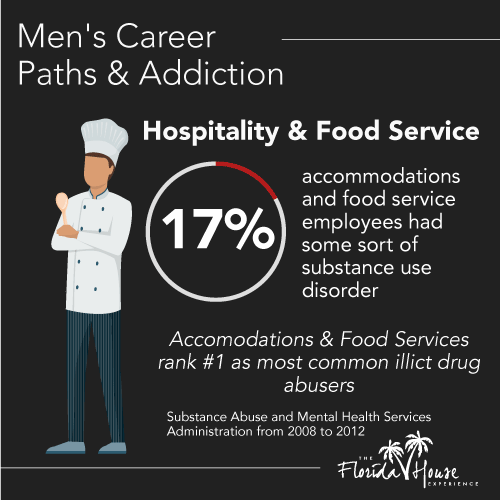 Hospitality and Food Service
Hospitality and Food Service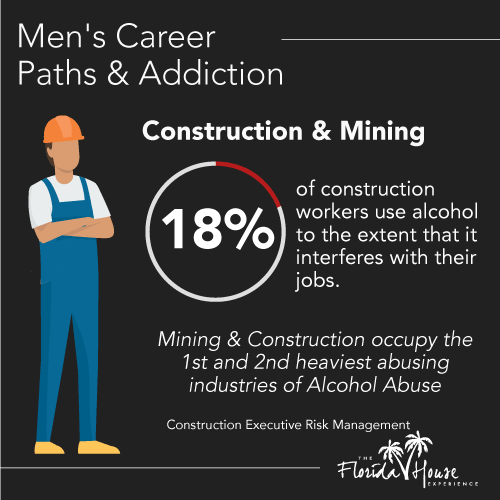 Construction and Mining
Construction and Mining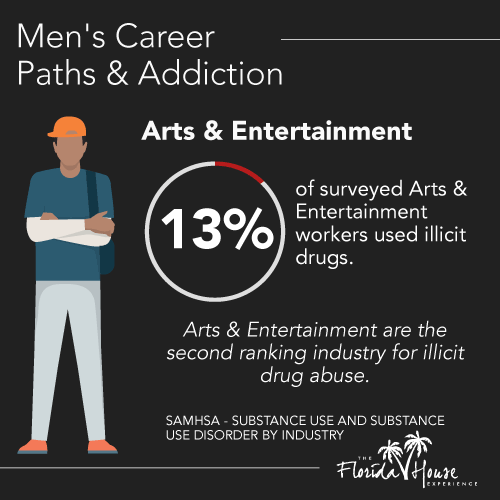 Arts and Entertainment
Arts and Entertainment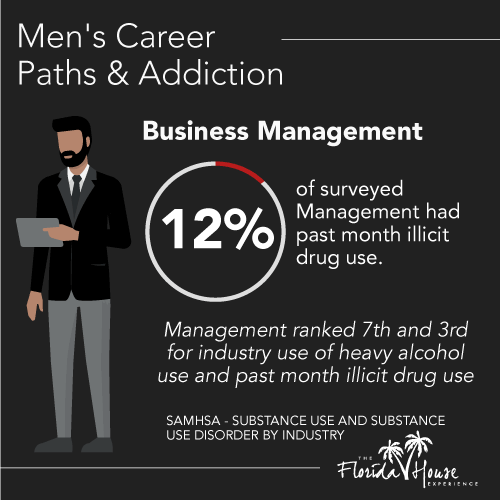 Business Management
Business Management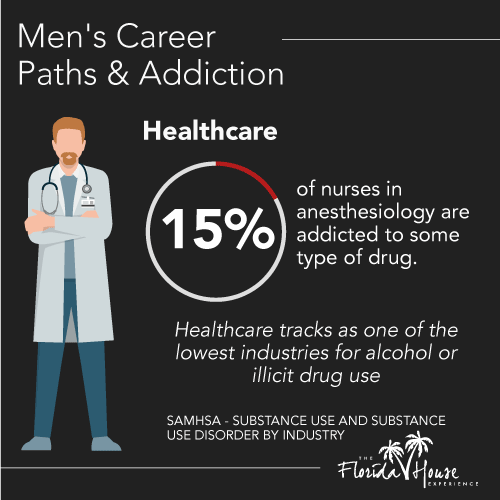 Healthcare
Healthcare





